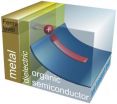(Press-News.org) WASHINGTON, June 23, 2014 — In this week's episode, Reactions is getting sexy. Our latest video highlights the ways chemistry has made sex safer and (in one surprising case) spicier. From latex condoms to warming lubricants, birth control to emergency contraception, chemistry plays a big role in the bedroom, and not just the chemistry between you and your partner. The video is available at http://youtu.be/54-rMC_67TM.
INFORMATION:
Subscribe to the series at Reactions YouTube, and follow us on Twitter @ACSreactions to be the first to see our latest videos.
The American Chemical Society is a nonprofit organization chartered by the U.S. Congress. With more than 161,000 members, ACS is the world's largest scientific society and a global leader in providing access to chemistry-related research through its multiple databases, peer-reviewed journals and scientific conferences. Its main offices are in Washington, D.C., and Columbus, Ohio.
To automatically receive news releases from the American Chemical Society, contact newsroom@acs.org.
Follow us: Twitter Facebook
#Sexychem: 4 ways chemistry makes sex safe -- and spicy (video)
2014-06-23
ELSE PRESS RELEASES FROM THIS DATE:
Long non-coding RNAs can encode proteins after all
2014-06-23
Case Western Reserve School of Medicine scientists have made an extraordinary double discovery. First, they have identified thousands of novel long non-coding ribonucleic acid (lncRNA) transcripts. Second, they have learned that some of them defy conventional wisdom regarding lncRNA transcripts, because they actually do direct the synthesis of proteins in cells.
Both of the breakthroughs are detailed in the June 12 issue of Cell Reports.
Kristian E. Baker, PhD, assistant professor in the Center for RNA Molecular Biology, led the team that applied high throughput gene ...
Exposure to BPA substitute causes hyperactivity and brain changes in fish
2014-06-23
CHICAGO, IL — A chemical found in many "BPA free" consumer products, known as bisphenol S (BPS), is just as potent as bisphenol A (BPA) in altering brain development and causing hyperactive behavior, an animal study finds. The results will be presented Sunday at the joint meeting of the International Society of Endocrinology and the Endocrine Society: ICE/ENDO 2014 in Chicago.
BPA has been linked to a wide range of hormone disorders, such as obesity, reproductive cancers and, recently, hyperactivity in children born to women exposed to high levels of this substance during ...
BPA stimulates growth of breast cancer cells, diminishes effect of treatment
2014-06-23
DURHAM, N.C. – Bisphenol A (BPA), a chemical commonly used in plastics, appears to increase the proliferation of breast cancer cells, according to Duke Medicine researchers presenting at an annual meeting of endocrine scientists.
The researchers found that the chemical, at levels typically found in human blood, could also affect growth of an aggressive hormone-independent subtype of breast cancer cells called inflammatory breast cancer and diminish the effectiveness of treatments for the disease.
"We set out to determine whether routine exposures to common chemicals ...
Hormone-disrupting activity of fracking chemicals worse than initially found
2014-06-23
CHICAGO, IL—Many chemicals used in hydraulic fracturing, or fracking, can disrupt not only the human body's reproductive hormones but also the glucocorticoid and thyroid hormone receptors, which are necessary to maintain good health, a new study finds. The results were presented Monday at the joint meeting of the International Society of Endocrinology and the Endocrine Society: ICE/ENDO 2014 in Chicago.
"Among the chemicals that the fracking industry has reported using most often, all 24 that we have tested block the activity of one or more important hormone receptors," ...
Common BPA-like chemical, BPS, disrupts heart rhythms in females
2014-06-23
CHICAGO, IL—Bisphenol S (BPS), a common substitute for bisphenol A (BPA) in consumer products, may have similar toxic effects on the heart as previously reported for BPA, a new study finds. The results were presented Monday at the joint meeting of the International Society of Endocrinology and the Endocrine Society: ICE/ENDO 2014 in Chicago.
In the years since research evidence first showed many potentially damaging health effects of the industrial chemical BPA, some manufacturers have switched to its chemical cousin, BPS, to make hard plastics and other products that ...
Researchers synthesize previously unknown form of magnesium carbide
2014-06-23
An international team of researchers from the United States, France and Moscow Institute of Physics and Technology (Russia) has synthesized a previously unknown form of magnesium carbide. This material can be used for synthesizing carbon nanostructures and other compounds. Details can be found in an article published in the journal Inorganic Chemistry.
A team of researchers from the Carnegie Institution for Science (United States), Paris-Sorbonne University, the European Synchrotron Radiation Facility in Grenoble,the SOLEIL synchrotron facility (France), the State University ...
Electrostatics do the trick
2014-06-23
Organic semiconductors allow for flexible displays (OLEDs), solar cells (OPVCs), and other interesting applications. One common problem in these devices, however, is the interface between the metallic contacts and the organic semiconductor material, where undesirable losses occur. Now Dr. Martin Oehzelt has shown what these losses between the metal and the organic semiconductors depend upon and how to minimize them. In particular, his model also explains why a thin, electrically insulating layer between the two materials can even facilitate the transition of charge carriers. ...
New study offers potential avenues for treatment of deadly nasopharyngeal cancer
2014-06-23
A team of scientists from the Cancer Science Institute of Singapore (CSI Singapore) at the National University of Singapore, National University Cancer Institute Singapore (NCIS) and National University Hospital Singapore (NUH), discovered a distinct mutational signature and nine significantly mutated genes associated with nasopharyngeal cancer, paving the way to developing novel therapies for this deadly disease.
The research group, led by Professor H. Phillip Koeffler, Senior Principal Investigator at the CSI Singapore and Deputy Director of NCIS, has conducted the ...
Cell stress inflames the gut
2014-06-23
Over 3.5 million people in Europe and the US suffer from Crohn's disease or ulcerative colitis – the two most common forms of IBD. Chronic bowel inflammation is caused by an overreaction of the immune system to the bacteria which naturally occur in the gut. "This overreaction can come about if, for example, the anti-stress mechanism in the cells of the intestinal mucosa does not function correctly," explains Prof. Dirk Haller of the TUM Chair of Nutrition and Immunology.
What Prof. Haller is referring to is the unfolded protein response (UPR) – a sequential chain of ...
Blood sugar improves with first gastrointestinal microbiome modulator, NM504
2014-06-23
CHICAGO, IL — In adults with prediabetes, a new drug that alters microbial populations and their environment in the gastrointestinal (GI) tract improves glucose tolerance—the body's response to consuming carbohydrates— after four weeks of treatment and without a change in diet. These results, from a pilot study, will be presented Monday at the joint meeting of the International Society of Endocrinology and the Endocrine Society: ICE/ENDO 2014 in Chicago.
The not-yet-named therapeutic, NM504, is the first in a new class of therapies known as GI microbiome modulators. The ...


